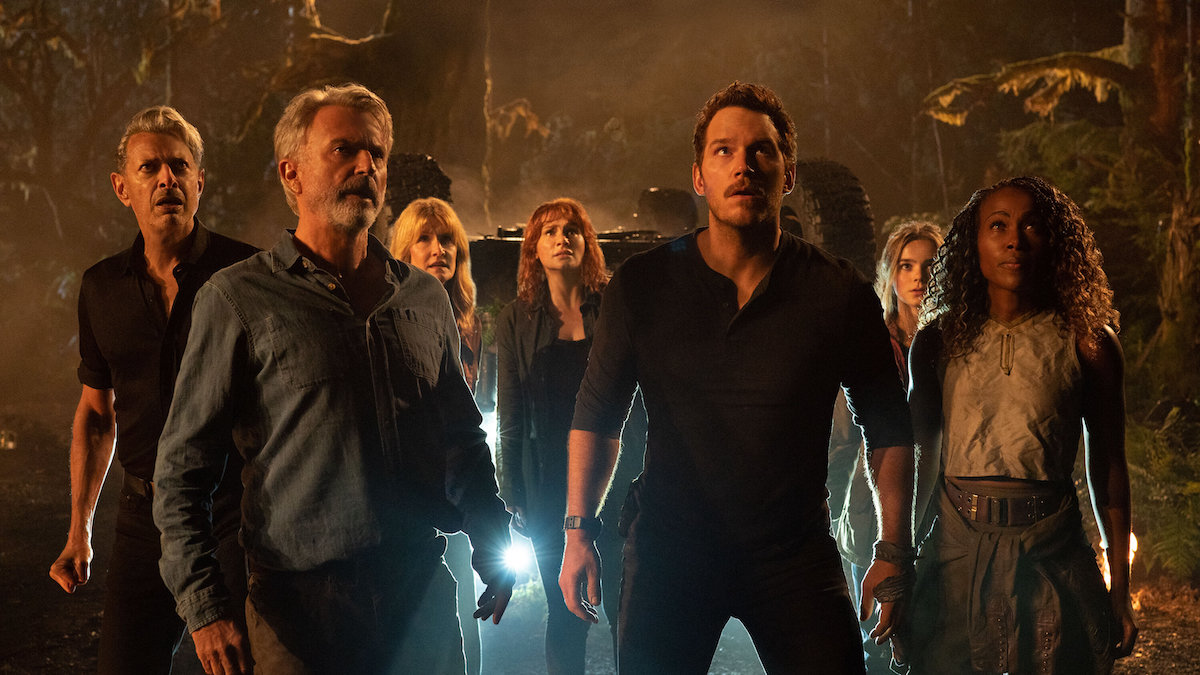There’s a new Jurassic World movie out in theaters, to round up the post-Spielberg trilogy that began in 2015 and continued in 2018, a long time for a trilogy these days—the Star Wars sequel trilogy came out in four years, as do many of these blockbusters (for example, three Kong & Godzilla movies 2017–2021). But Jurassic World: Dominion is different from most of them in that behind the spectacle there really is something shocking and maybe thrilling to notice.
Of course they make it hard to notice. First of all, the franchise owes much of its renewed success to star Chris Pratt, who seemed like he was going to have a great career once America saw him in Guardians of the Galaxy (2014) but who has since sputtered. This is partly because he seems, like so many actors these days, beholden to franchise characters, and partly because his attempt to escape that fate led to failed remakes, like the western The Magnificent Seven (2016) and sci-fi movies like the romantic Passengers (2016) and the alien invasion The Tomorrow War (2021).
Pratt is worth talking about because he’s the kind of tall, handsome actor America loves, friendly and funny, and also an avowed Christian—what used to be called a good role model for the kids, who love him. Yet these may be career drawbacks these days—certainly there are no characters written with actors like him in mind. Now, even in this dinosaur franchise, he’s largely irrelevant, replaced by the plethora of actors, some brought back for the sake of nostalgia (Laura Dern, Sam Elliott, Jeff Goldblum), some new, brought in to appease the woke idols of our times and who don’t do much acting, given that they’re just supposed to satisfy the need for diversity.
Fans of Pratt are likely to be disappointed. Granted, there’s still something left of his Indiana Jones–esque act, only with dinosaurs, and a few chases through the tropical jungle that might excite, but frankly not much. Most of the first half of the movie is more an imitation of James Bond thrillers, with espionage, underworld dens of crime, and motorized chases through beautiful old European cities—this time on the island of Malta, of all places, perhaps because it’s novel. But there’s a problem even here. Imagine Bond not being allowed to shoot even his enemies! Here our protagonists are chased by dinosaurs and, in this movie, the dinosaurs are the good guys—they have be saved or spared, however ferocious, since only people make dinosaurs evil by weaponizing them. The dinosaurs are treated as almost human, but in a way better, since they’re by definition innocent.
So the second half of this far-too-long movie (at 146 minutes, some 20 minutes longer than the previous ones, and about an hour longer than it needs to be) turns into the kind of story writer-director Colin Trevorrow wants to tell, which is a mystery about the future of America and the world, a technological future that retrieves nature—the dinosaurs—and gets rid of men, offering a vision of women who can create life without men and who now don’t even need men for war, since they have new pets, which, although much more ferocious, are nevertheless far less threatening. A bit of a surprise for the fans, I think!
In the beginning the movie hides this idea behind a story where Pratt and the woman he loves—they’re unmarried—are raising a girl as their daughter, in the remotest Sierra Nevada mountains, to protect her from evil corporations. This girl, Maisie, is the result of a genetic experiment they do not understand. They saved her life in the previous movie and at the same time released the dinosaurs on the planet—the two are somehow connected but we know not how.
Then we’re invited to attend a kind of morality play about an evil genetics corporation, whose founder/CEO is played by Campbell Scott as an image of Tim Cook and Mark Zuckerberg. He seems benevolent, but of course we’ve all known for two generations that every businessman in a Hollywood blockbuster is a moral monster. He’s in charge of two things: the dinosaurs, because of shady government contracts, and, increasingly, the world’s grain supply, through genetically modified seeds, and he’s out to squeeze the competition to get a monopoly. The economic problem is not what matters here—the deeper implications matter. Control of genetics is control of life, animal as well as plant, and, we will learn, humans are not exempt—after all, we call ourselves human resources for a reason.
This mastermind stands for a manly attempt to dominate, which, of course, is intolerable in the Progressive era. But the movie suggests that the problem is not that he’s controlling but rather that he’s narrow-minded. His control of life is unambitious, as it doesn’t include creating new life; after all, he’s just a man. Instead, Maisie turns out to be (spoiler coming!) the clone of a genius young woman who impregnated herself with her own DNA after cleaning it up, i.e., removing the disease that would eventually kill her, all of which she explains to the camera in recordings that mix a video journal with a TED talk and that finally reveal her own pregnancy.
At that point it becomes obvious that not even our woke protagonists matter—they are mere propaganda. What matters is this power of taking control over life and getting rid of men and the civilization they made. The clue in the story is a female dinosaur that manages to reproduce asexually, which turns out to be the pattern used by the genius woman to clone herself. Life as we know it is intolerably unjust if women of genius die of terrible diseases. But studying those diseases scientifically can lead to new life and, since everyone is afraid of death, everyone must obey the scientists.
For example, the scientists teach us that we needn’t fight the dinosaurs, merely stay out of their way. Of course, this reduces our awe of monsters to mere scientific curiosity, or it uses the curiosity of the audience as an opportunity to rationalize the scientists’ behavior. The strange consequence is that animals seem much less important: if they are mindless, compared to us, all we have to do is reengineer them, so to speak, to rationalize evolution and the cosmos. After all, dinosaurs disappeared by accident, and also appeared by accident; by taking scientific control over life, we come as close as possible to getting rid of the accidents—we would be as gods.
This story reminded me of John Milton’s Paradise Lost, where Eve is tempted with knowledge by Satan and only after that proud first attempt is foiled by God does she receive the gift of giving life through birth. Of course, in the movie, Adam is even more foolish than in Milton’s poem, where there’s not much to recommend him. Moreover, there is no God. Finally, the role of the tempting serpent would seem to be reserved for the dinosaurs. Consequently, the new Eve does get the powers of modern science to wield for herself and to make herself creator of new life in her own image.
A new religion can be created on this pattern—a new Jurassic garden with a new Eve, but no God or politics! This is more than most of our movie franchises attempt and epitomizes the interest in paganism as a path to transhumanism that animates more and more of our franchises, whether it’s the Planet of the Apes or King Kong and Godzilla. Certainly more will follow because, like a deadly virus, terrible ideas are self-replicating.

